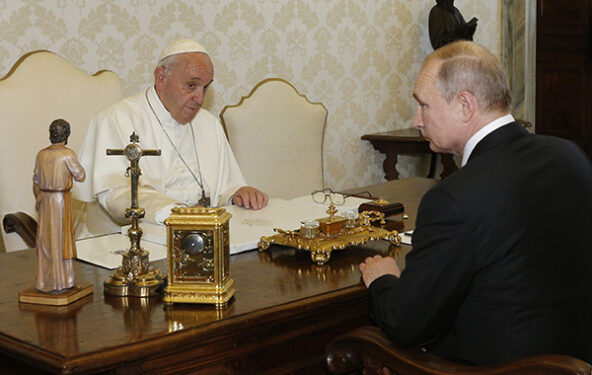
By Cindy Wooden
VATICAN CITY (CNS) — Pope Francis’ secretary of state reaffirmed the pope’s offer to go to Moscow personally to try to convince President Vladimir Putin to stop his war on Ukraine but said the Kremlin had yet to respond.
[RELATED: Pope Francis Says He Reached Out to Putin About Meeting in Moscow to Make Case For Peace]
Cardinal Pietro Parolin, secretary of state, told reporters late May 4, “There has been an offer from the Holy Father to go to Moscow to meet personally with President Putin. We are waiting for them to tell us what they want, what they intend to do.”
“I think that at this point there are no other steps to take,” the cardinal said.
In an interview with the Italian newspaper, Corriere della Sera, published May 3, Pope Francis said he had had Cardinal Parolin send his offer to Putin in mid-March in an attempt to convince the Russian president to stop the war or, at least, to respect humanitarian corridors to evacuate innocent civilians.
“We still have not had a response, and we are still being persistent, even though I am afraid Putin may not be able to and may not want to have this meeting right now,” the pope had said. “I am doing what I can. If Putin were to open the door. …”
Although the pope said he was willing to go to Moscow, he repeated his decision not to accept an invitation from Ukrainian President Volodymyr Zelenskyy to visit Kyiv “for now” because he did not think doing so would help stop the war.
Many people, especially Ukrainians, are disappointed that the pope will not go to Kyiv and has not condemned Putin or Russia by name.
Some also expressed concern that the pope seemed to be overly understanding of Putin’s reasons for invading Ukraine. The Corriere article said Pope Francis “also attempted to reason about the roots of this behavior, about the motivations that drive him to such a brutal war. Perhaps ‘NATO’s barking at Russia’s door’ led the head of the Kremlin to react badly and to trigger the conflict.”
Pope Francis told the newspaper that he could not say the possible expansion of NATO “provoked” Putin, but he wondered if it “perhaps facilitated it.”
Meanwhile, Archbishop Paolo Pezzi of Moscow said in an interview May 6 the hope that dialogue will work is always the Christian position.
“I believe that our hopes, but perhaps also those of the pope, are based primarily on one aspect, namely that the other is never an enemy: he is ‘other,’ ‘other than us,’ different and probably has different existential positions, but he is still a child of God, a man, a created being, with whom it is always worth seeking dialogue for the solution of problems,” the archbishop told Fides, news agency of the Congregation for the Evangelization of Peoples.
While Cardinal Parolin said the Kremlin had not responded to Pope Francis’ message, the Russian Orthodox Church did take exception to the pope’s interview with Corriere della Sera in which the pope said Patriarch Kirill of Moscow should not “turn himself into Putin’s altar boy.”
The pope had said that when he spoke to the patriarch on Zoom in mid-March, “He spent the first 20 minutes holding a piece of paper reading all the reasons for the war.”
“I listened to him, and I told him, ‘I don’t know anything about this. Brother, we are not clerics of the state, we cannot use the language of politics, but of Jesus. We are shepherds of the same holy people of God. That is why we must seek the path of peace, to cease the blast of weapons,'” he said.
Commenting on the interview as a whole, the Moscow Patriarchate said, “Pope Francis chose an incorrect tone to convey the content of this conversation” with the patriarch. “Such statements are unlikely to contribute to the establishment of a constructive dialogue between the Roman Catholic and Russian Orthodox churches, which is especially necessary at the present time.”
